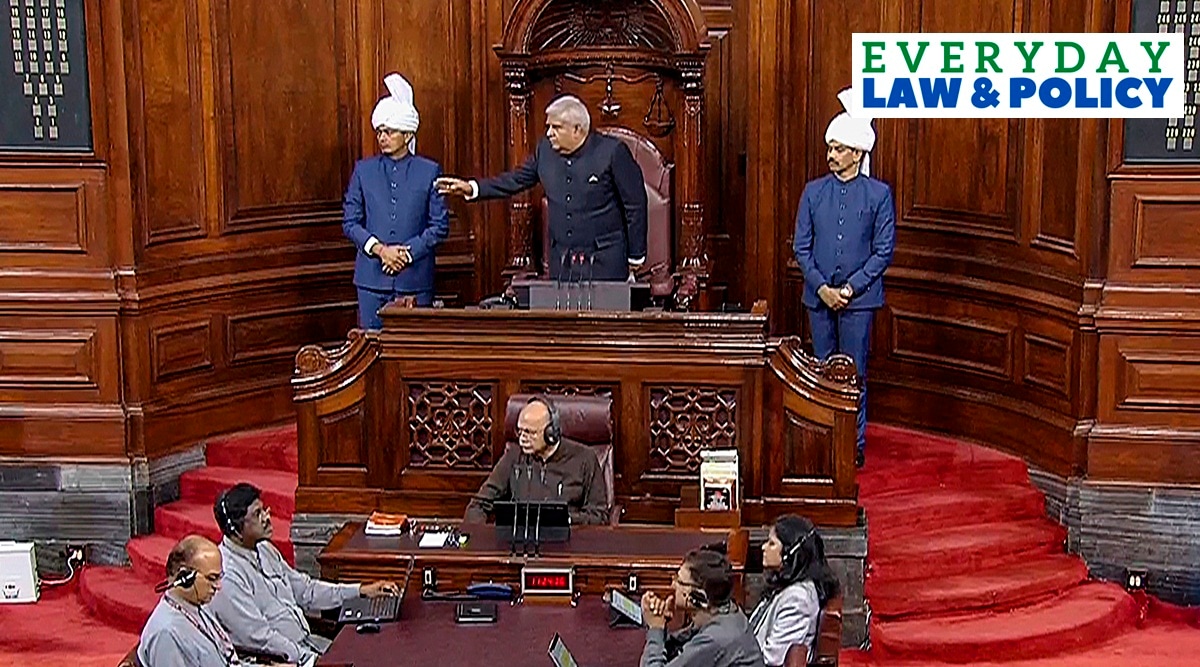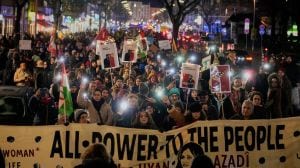What is a Privilege Motion and how does the Committee of Privileges in Parliament examine it?
Rajya Sabha Chairman Jagdeep Dhankar has referred complaints against Raghav Chadha, Derek O'Brien to the Privileges Committee. When can this be done and what are the committee's powers?
 Rajya Sabha Chairman Jagdeep Dhankhar conducts proceedings in the House during the Monsoon session of Parliament, in New Delhi, Friday, Aug. 4, 2023. (PTI Photo)
Rajya Sabha Chairman Jagdeep Dhankhar conducts proceedings in the House during the Monsoon session of Parliament, in New Delhi, Friday, Aug. 4, 2023. (PTI Photo) Rajya Sabha Chairman Jagdeep Dhankhar referred complaints related to the privilege of the House against TMC’s Derek O’Brien and AAP’s Raghav Chadha to the privileges committee on Thursday (August 3).
This comes amid differences between the ruling party and some opposition parties that have plagued the ongoing Monsoon Session of its sittings. The opposition complaints were primarily about asking Prime Minister Modi to make an appearance in the Parliament to speak about the ethnic violence that has taken place in Manipur.
“On consideration of the facts, the Hon’ble Chairman, Rajya Sabha has referred the matter under Rule 203 of Rules of Procedure and Conduct of Business in the Council of States (Rajya Sabha) to the Committee of Privileges for examination, investigation and report,” said a bulletin issued by the Rajya Sabha secretariat late on Thursday night. Under this rule, the Chairman can refer any question of privilege to the Committee of Privileges for examination and investigation. What is the basis of such referrals and what is the function of this Committee?
What is the basis of the complaints against Chadha and O’Brien?
The Rajya Sabha secretariat said the complaint against O’Brien was filed by BJP members Laxmikant Bajpayee and Surendra Singh Nagar, while that against Chadha was filed by Sushil Kumar Modi and Deepak Prakash.
The notice against O’Brien was filed for repeated publishing of the clippings of his statement made in the House on July 20 through his verified personal Twitter handle, despite the fact that those were expunged or removed from the record by the chairman.
The complaint against Chadha, dated July 25, alleges an “intentional and deliberate act of presenting misleading facts to the media” on July 24 with respect to the suspension of “Sanjay Singh, Member, from the service of the Council for the remaining period of the 260th (Monsoon) session of Rajya Sabha for his indecorous behaviour and repeated violation of directions of the Chair”.
It added that some members alleged Chadha allegedly stated that Singh would continue to sit inside the Chamber despite being suspended from the service of the Council. But this happening would be in violation of Rule 256 of the Rules of Procedure and Conduct of Business in the Council of States (Rajya Sabha), stated the notice.
What is a privilege motion?
The two rules referred to here relate to the concept of parliamentary privilege, which are certain rights conferred to the Members of Parliament for conducting the business of the Parliament. There is no codified list of the exact privileges, but it includes the right of free expression in the course of Parliamentary debates and Members of Parliament will not be liable for court proceedings for this.
If there is a belief that such a privilege has been breached, a motion can be raised by any member. It can be admitted by the Chairman. They can then refer it to the Privileges Committee. The Chairman can, from time to time, nominate such a Committee, consisting of ten members. It will also have a Chairman appointed by the Rajya Sabha Chairman.
The right to raise a question of privilege is based on satisfying two conditions, namely: (i) the question shall be restricted to a specific matter of recent occurrence, and (ii) the matter requires the intervention of the Council.
Similar provisions exist in Lok Sabha with the Speaker having the power to make such decisions. The Speaker/RS chairperson is the first level of scrutiny of a privilege motion. Therefore, the Speaker/Chair can decide on the privilege motion himself or herself or refer it to the privileges committee of Parliament.
What action can the privileges committee take?
The mandate of the committee is to examine such cases and “make such recommendations as it may deem fit”. It can call the relevant people as part of its examination and look at related documents. It has to then make a report and if the Council has not fixed any time for its presentation, the report shall be presented within one month of the date on which reference to the Committee was made.
A motion has to be passed for the consideration of the report and amendments can be suggested. The Chairman or any member of the Committee or any other member can move that the Council agrees, disagrees, or agrees with amendments, with the recommendations contained in the report.
Are privilege notices rejected often?
A large number of notices are rejected, with penal action recommended in only a few cases.
The most significant case was in 1978 when Indira Gandhi, who had just won the Lok Sabha elections from Chikmaglur, was expelled from the House. Then home minister Charan Singh moved a resolution of breach of privilege against her following observations made by the Justice Shah Commission, which probed excesses during the Emergency.
It was the culmination of a year-long investigation by such a committee in the Lok Sabha. The Indian Express reported at the time that she was held guilty:
“… for obstructing four government officials from collecting information for a question on Maruti tabled by Jyotirmoy Bosu in 1975. The Committee has also indicted R K Dhawan, former additional private secretary to the prime minister and D Sen, former director of the CBI, for the same reason. The Committee has said they all deserve punishment but has left it to the “collective wisdom” of the House to punish her and the two others. The two volume, 1,007-page report of the Committee was placed before the Lok Sabha today by Samar Guha, chairman of the Committee. Mrs Gandhi was not present when Guha placed the report.”
Another case was the expulsion of Subramanian Swamy from the Rajya Sabha in 1976. Swamy was charged with bringing disrepute to Parliament through his activities through interviews in foreign publications that were construed as “anti-India propaganda”.
On December 23, 2005, 11 “tainted” MPs, who were caught in a sting over the cash for query scandal, were expelled from the House.
(With PTI inputs)
- 01
- 02
- 03
- 04
- 05





































